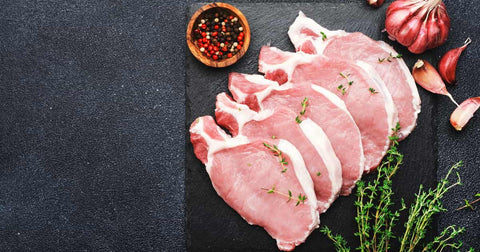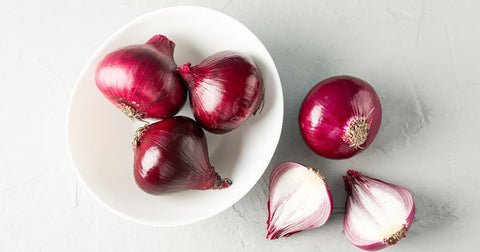Pork chops are a dinnertime favorite for many households but as people become more health-conscious, they’re beginning to ask questions like are pork chops healthy, or even what is pork exactly? With conflicting advice about red meat, cholesterol, and processed meats, it’s easy to feel unsure.
In this article, we’ll explore pork chop nutrition, compare different cuts like pork tenderloin, address concerns around pork calories, and even take a look at the scientific reasons not to eat pork. We’ll also explain when a food sensitivity test kit may help uncover hidden food intolerance to pork.

What Is Pork?
Let’s start with the basics what is pork?
Pork is the meat of a domestic pig and is one of the most widely consumed proteins worldwide. In many cultures, it’s a staple in the form of chops, roasts, tenderloin, bacon, and sausage. It’s considered red meat due to its myoglobin content, though lean cuts like tenderloin often rival chicken in fat and calorie levels.
Common cuts of pork include:
-
Pork chops (from the loin)
-
Pork tenderloin (extra lean)
-
Pork shoulder (fattier, used for pulled pork)
-
Pork belly (used to make bacon)
-
Pork ribs (higher in fat)
Pork Chop Nutrition: What’s in a Serving?
If you're asking are pork chops healthy, it's essential to understand what's in a typical serving. The healthiness of pork largely depends on the cut, cooking method, and portion size.
Pork chop nutrition per 3 oz cooked (boneless, center-cut, grilled):

-
Calories: ~200
-
Protein: ~22g
-
Fat: ~12g (with ~4g saturated fat)
-
Cholesterol: ~65mg
-
Iron: ~0.7mg
-
B vitamins: Particularly high in thiamin, niacin, and B6
Pork chops offer a substantial amount of lean protein and essential nutrients but can be high in fat depending on the cut.
Is Pork Tenderloin Healthy?
Among all pork cuts, is pork tenderloin healthy? The answer is yes it’s one of the leanest cuts available, often compared to skinless chicken breast in terms of fat and calorie content.
Pork tenderloin nutrition per 3 oz cooked:
-
Calories: ~120
-
Protein: ~22g
-
Fat: ~3g
-
Saturated Fat: <1g
This makes tenderloin a good option for those watching their fat intake or seeking lean protein sources.
Pork Calories: How Does It Fit Into a Healthy Diet?
Pork calories vary by cut and cooking method. While lean pork fits well into many meal plans, fried or breaded pork chops can significantly increase calorie intake.
Tips for keeping pork healthy:
-
Choose lean cuts (loin or tenderloin)
-
Trim visible fat before cooking
-
Grill, bake, or broil instead of frying
-
Watch your portion size (3 to 4 ounces is a good target)
When prepared thoughtfully, pork can support weight management and muscle maintenance thanks to its high protein content.
Scientific Reasons Not to Eat Pork: What Are the Concerns?
While pork offers nutritional benefits, some health experts raise caution particularly around processed pork and certain cooking practices.
Common concerns include:

-
Parasites: Undercooked pork can harbor parasites like Trichinella, though modern food safety standards have drastically reduced this risk.
-
Processed pork risks: Bacon, sausage, and cured meats have been linked to increased cancer risk due to nitrates and preservatives.
-
Saturated fat and sodium: Some cuts are high in saturated fat and salt, which may affect heart health.
-
Ethical or religious reasons: Some individuals avoid pork for spiritual or cultural reasons.
These scientific reasons not to eat pork don’t apply universally but are worth considering when evaluating pork’s place in your diet.
Could You Have a Food Intolerance to Pork?
Even when cooked properly, pork can cause digestive discomfort or other symptoms in some people especially those with food intolerance.
Common signs of food sensitivity to pork include:
-
Bloating or indigestion after eating
-
Fatigue or brain fog
-
Skin irritation
-
Headaches or sinus issues
If you suspect pork (or any food) is affecting your health, a food sensitivity test kit can help identify potential triggers. Knowing your body’s response can help you enjoy meals without the mystery symptoms.
Are Pork Chops Healthy or Not?
So, are pork chops healthy? The answer depends on how they're prepared and who’s eating them.
Pork chops are healthy when:
-
Trimmed of excess fat
-
Cooked without heavy breading or frying
-
Paired with vegetables or whole grains
-
Eaten in moderation
They may not be the best choice when:
-
Deep-fried or smothered in sugary sauces
-
Consumed in large portions frequently
-
Replacing leaner protein options too often
-
Paired with high-fat, high-sodium sides
Final Verdict: Should You Eat Pork?

Pork especially lean cuts like pork tenderloin and center-cut chops can be part of a healthy diet when prepared properly. It provides high-quality protein, key vitamins, and flavor versatility. However, processed pork and fatty cuts should be limited for heart and digestive health.
If pork causes unexplained symptoms, it might be a food intolerance. In that case, a food sensitivity test kit can help you understand your unique dietary needs and make more confident choices.
Frequently Asked Questions (FAQs)
1. Are pork chops healthy compared to other meats?
Yes especially when lean cuts are grilled or baked. They provide protein and essential nutrients with fewer calories than fattier red meats.
2. What is pork classified as?
Pork is considered red meat due to its myoglobin content, though some cuts are leaner than poultry.
3. Is pork tenderloin healthy?
Absolutely. It’s one of the leanest and most heart-friendly pork options available.
4. What are the scientific reasons not to eat pork?
Concerns include parasites (if undercooked), links to processed meats and cancer risk, and high saturated fat or sodium in certain cuts.
5. Can pork cause food intolerance symptoms?
Yes. Some people experience bloating, fatigue, or skin issues after eating pork, which can be identified through a food sensitivity test kit.


.png?v=1737390083)
.png?v=1737187409)


